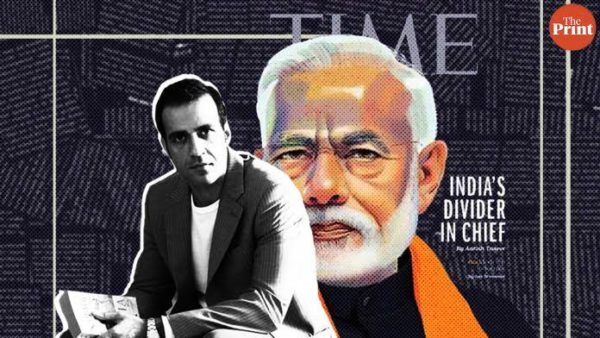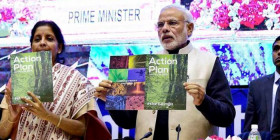Somebody said “Value your opinion, it’s worth as much as theirs”. But this simple yet so effective message seems to be lost on many Indians. Possibly patches of the colonial mentality endure behind the sheen of modernity and progress !!! A commonplace article by a designated ‘Time ‘ magazine author labeling Narendra Modi as the Divider-in-Chief seemed to have the cannonballs rolling for the political opponents to load their artillery and criticize the current dispensation and hold it responsible for all the ills that seem to ail the nation.
The liberal media very cleverly couches its criticism with syllogisms as to why this article is a tip off for the nation to self reflect and guard itself by anticipating the danger to our ‘immaculate’ systems that have ensured the well being of our populace for decades now. The opponents are of course having a field day and are flogging the report for what it is worth. While the policies of the present government and their success might be a subject of debate for many, the ability to appraise and evaluate should not be subject to the speculations of a foreign body. It goes without saying that these organizations are driven with a set agenda not least ‘Time’ which has a diverse range of affiliations.
The author of the piece, Aatish Taseer has built his credentials as a liberal of sorts, his parentage (father, the late Salman Taseer, governor of Punjab, Pakistan and mother Tavleen Singh, Indian columnist) contributing in no small measure to this prominence. While Aatish did grow up in New Delhi and went to a residential school in Kodaikanal, his article one surmises would not have been honored with the importance it has since received had it not been endorsed by ‘Time’.
His opinion on the political situation in India would therefore have the same relevance for an Indian as would a native Punjabi journalist’s critique regarding the agricultural policies of Canada on a Canadian citizen. While one does not deny Aatish Taseer the right to say it, the relevance and timing of the article are suspect.
The trend of citing an international source to belittle a national leader is not a new phenomenon in India, and the national media is the first to latch onto it, but what is glaringly evident is their reluctance to report any positive feedback with the same enthusiasm. The little or no prominence given to the second story in the same issue titled “Modi the reformer” only served to highlight the agenda driven minds of the agencies at work. Evaluation of performance is a necessity, but the traction that such an assessment receives due to opinionated articles by foreign agencies with vested interests is not a welcome trend.
There is a certain myth that surrounds unbiased behavior and Oscar Wilde said it best “It is only about things that do not interest one, that one can give a really unbiased opinion; and this is no doubt the reason why an unbiased opinion is always valueless.” It of course remains to be seen as to how many people actually read the article of a magazine with a declining circulation of 2 million in late 2017 (https://www.wsj.com/articles/for-time-inc-s-magazines-fewer-copies-is-the-way-forward-1507667214 ), down from 3 million in 2012. In an era of rapidly reducing reading habits and digital news subscribers, sensationalist headlines spawn a thread of misinformation that infect an entire generation who have not the advantage of being inoculated with an analytical capacity.
This in turn only serves the purpose of further confusing a muddled polity who are only too ready to assume (if one were to resort to hyperbole) that such an article constitutes a damning report by the international community about the state of the country.
One would assume that the citizens having experienced the situation first hand, would not require the external hand to tutor them on the best course of action to secure their future.
Article By: Shantanu Sharma






Leave a reply